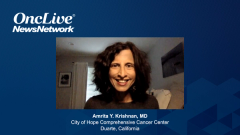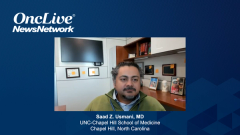
Key Takeaways From the ASH 2021 Meeting on Newly Diagnosed and Relapsed/Refractory Multiple Myeloma
Closing out her discussion on the management of newly diagnosed and relapsed/refractory multiple myeloma, Amrita Y. Krishnan, MD, shares key takeaways from the ASH 2021 Annual Meeting.
Episodes in this series

Transcript:
Amrita Y. Krishnan, MD: The other things of interest at ASH [American Society of Hematology Annual Meeting] cemented what we thought, now that we have more data from the GRIFFIN trial. There was a follow-up presented by Jacob Laubach about daratumumab-Revlimid-Velcade-dexamethasone vs RVd [lenalidomide, bortezomib, dexamethasone], stem cell transplant, consolidation, daratumumab–RVd [lenalidomide, bortezomib, dexamethasone] vs RVd [lenalidomide, bortezomib, dexamethasone], and then maintenance daratumumab-R [lenalidomide] vs R [lenalidomide]. With longer follow-up, we confirmed the greater depth of response in terms of MRD [minimal residual disease] negativity with the daratumumab arm. We didn’t see a significant statistically PFS [progression-free survival] benefit, but there was a trend to a better PFS benefit in the daratumumab arm. For me it cemented the use of quadruplet therapy for initial induction for the majority of patients.
I don’t want to overlook another class of drugs that have been presented before because we continue to have more follow-up data and await more data in terms of further combinations as well as use in earlier lines of therapy. Those are CELMoDs [cereblon E3 ligase modulators]. There were data presented at ASH about iberdomide in combination with dexamethasone in patients with relapsed/refractory myeloma and the dose expansion of CC-220 in the MM-001 trial. What they showed in this are patients who had greater than 3 prior lines of therapy, including lenalidomide, pomalidomide, a PI [proteasome inhibitor], and anti-CD38 antibody—patients who had a fair amount of prior therapy.
They reported on 107 patients with a median of 6 prior lines of therapy and showed an overall response rate of 26%, suggesting that in this heavily refractory group of patients, they could get responses with this new class of drugs. That includes patients who were refractory to other immunomodulatory agents. The adverse-effect profile is not unexpected in terms of hematologic toxicity in over 20% of patients, with 27% of patients having a grade 3/4 infection. But it suggested this oral regimen might be an option for patients, including patients who have advanced heavily pretreated myeloma.
One of my takeaways from ASH was the use of quadruplet therapy for up-front induction. We have the phase 3 German study of isatuximab–RVd [lenalidomide, bortezomib, dexamethasone] vs RVd [lenalidomide, bortezomib, dexamethasone]. We have the GRIFFIN study with daratumumab–RVd [lenalidomide, bortezomib, dexamethasone] vs RVd [lenalidomide, bortezomib, dexamethasone], both showing a greater depth of response with the use of the quadruplet induction. The next takeaway I have from ASH is the idea of using bispecific antibodies, and if you relapse on 1, it doesn’t preclude you from using another. Using 1 T-cell engaging therapy doesn’t preclude the use of another, suggesting that we’re going to be able to use this earlier in the course of disease and no longer thinking about reserving these therapies for our last therapy. That was very encouraging for the future of myeloma therapy: we have new classes of drugs that we can use early in the course of disease and probably in combination with our established therapies to improve care for our patients with myeloma.
Transcript edited for clarity.






































